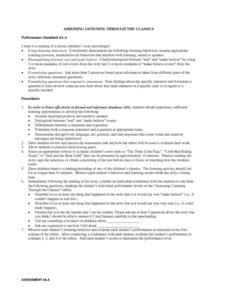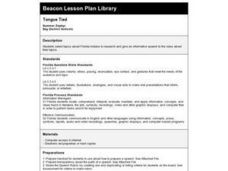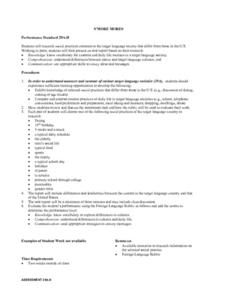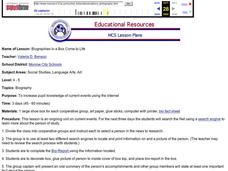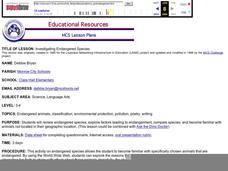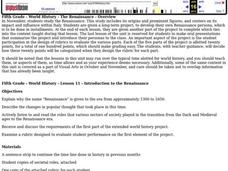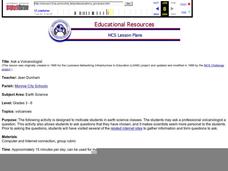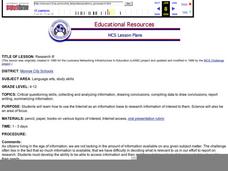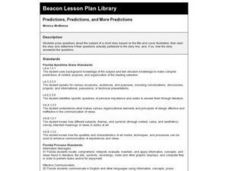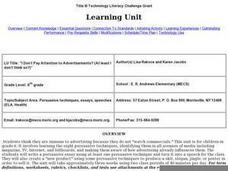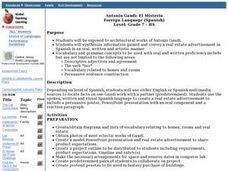Curated OER
ASSESSING LISTENING THROUGH THE CLASSICS
Students demonstrate listening behaviors. They assume appropriate listening position, minimize/avoid behaviors that interfere with listening, and attend to speaker. They distinguish between real and make believe and cite 2 or more...
Curated OER
LOOKING AT A CHARACTER
Second graders investigate self- and teacher-selected literature (e.g., picture books, nursery rhymes, fairy tales, poems, legends) from a variety of cultures. They re-enact and retell stories, songs, poems, plays, and other literary...
Curated OER
Tongue Tied
Fourth graders select topics about Florida Indians to research and give an informative speech to the class about their topics. The main focus' of this lesson are the research, and the speech that each student gives to the class.
Curated OER
S'More Mores
Learners consider social practices common to their target language. They work in pairs to research social practices common to the target language society that differ from those in the United States. They prepare a three-minute...
Curated OER
Field Trip Summary Report
Pupils create a brief report summarizing their experience on a field trip or community based instruction trip. After returning from their experience, they jot down several points of interest. Students draw a picture that focuses on one...
Curated OER
Walk on the Wild Side
Have your class practice alliteration using this activity. Learners listen to stories with alliterative elements and create their own sentences illustrating this technique. The activity is incomplete, but could be enhanced to provide a...
Curated OER
Independent - To Be or Not Top Be - Day 2, Lesson C: Freedom of Speech
Fifth graders explore the following questions: What is it? What is it like? What is an example?
Curated OER
Do a Ditty
Fourth graders work in cooperative groups to create a ditty to teach the characteristics that distinguish literary forms to younger students. The ditty is performed before the class.
Curated OER
Biographies in a Box Come to Life
Students use the Internet to research someone's biography.
Curated OER
Investigating Endangered Species
Learners pick an endangered animal to research and report their findings to the class.
Curated OER
Olympic Dream Makers
Tenth graders describe the philosophies behind the Olympic Games, identify historical facts related to the Games, and discover "up close and personal" facts related to an Olympian of their choice.
Curated OER
The Renaissance
Fifth graders examine the rise of the Renaissance and the contributions and roles of various groups such as ancient Greeks, Muslim scholars, the aristocracy, the Catholic Church, and tradesmen. They develop and write a report on a...
Curated OER
The Link With TV and Vegetables
Fourth graders explore Philo Farnsworth, a fourteen year old farm boy in 1921, who thought up the idea of television. By the time he was in a high school physics class he drew his concept.
Curated OER
Ask a Volcanologist
Students ask a professional volcanologist a question online. This lesson allows students to ask questions that they have chosen, and it makes scientists seem more personal to Students.
Curated OER
Dia de Los Muertos
Students construct concept maps after reading an article. In this Dia de Los Muertos activity, students read about the celebration in Spanish and create concept maps explaining what they learned. Students share with their peers.
Curated OER
Team Players
Students examine a school to career website. They collect and collate data about careers from their own data collection. They determine which skills and abilities ensure successful teamwork. They research two careers that they come...
Curated OER
Louisiana Parishes
Students research a parish in Louisiana. They research things such as: what makes that parish different from others, major cities, what is the land like there, are there any bodies of water, what is the population, are their any colleges...
Curated OER
Predictions, Predictions, and More Predictions
Third graders pose questions about the subject of a short story based on the title and cover illustration; then read the story and determine if their questions actually pertained to the story line, and, if so, how the story answered the...
Curated OER
Get Physical
Fourth graders research a physical exercise using primary source information. They analyze the information and write a report that validates, rejects, or qualifies the information.
Curated OER
How to Invest Your Money
Students use the Internet to research various companies to determine if they are smart investment choices. Using a role-play activity, they pretend they have received an inheritance from a distant relative. They invest the money into...
Curated OER
I Don't Pay Attention to Advertisements
Sixth graders examine the eight persuasive techniques, identifying them in all avenues of media including magazine, TV, Internet, and billboards, and making them aware of how advertising already influences them. They write an essay using...
Curated OER
Antonio Gaud¿¿: El Misterio
Students examine the architecture of Antonio Gaudi. Using the Internet, they research his life and summarize the information. They create a real estate advertisement in Spanish. Using new vocabulary, they use descriptive adjectives and...
